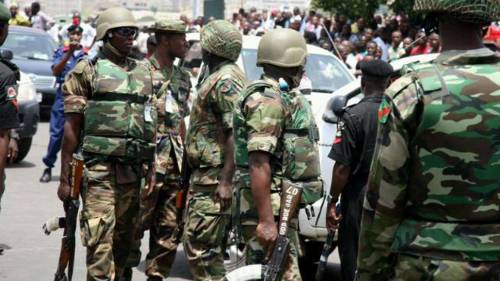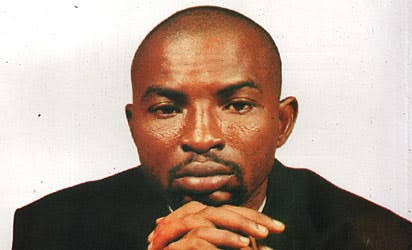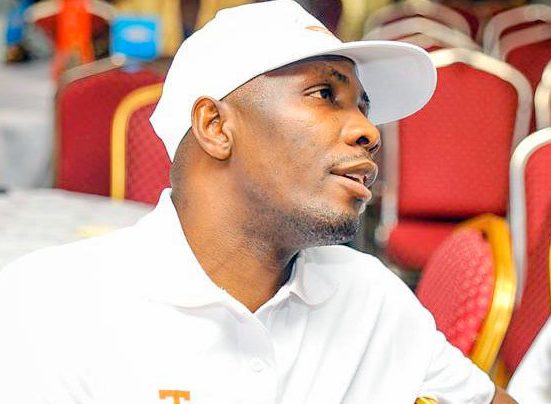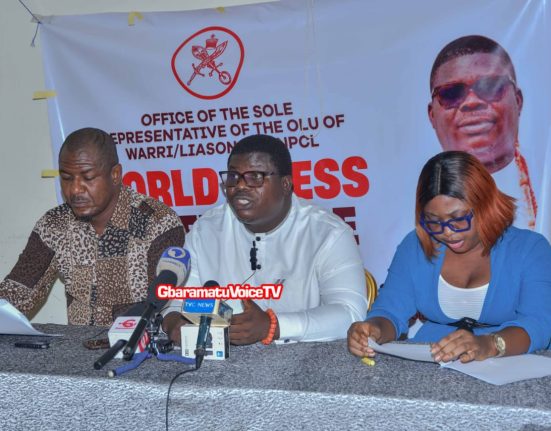Why ‘drunk’ Nigerian soldiers did not kill me, says VOA reporter arrested by soldiers in Oyigbo
Grace Alheri Abdu, a Voice of America, Hausa Service, Producer who was arrested on Saturday by soldiers in Oyigbo Town, Oyigbo local government of Rivers State, has told The Neighbourhood she was grateful to God she returned alive to her hotel room.
According to her, the drunk soldiers had told her she was alive just for two reasons.
The VOA Producer was arrested by soldiers at about 2:00pm but regained her freedom at about 7.00pm after about five hours of detention and threats by soldiers whom she told this newspaper were “all drunk and intoxicated.”
Speaking to The Neighbourhood in Port Harcourt, the Rivers State capital, on Saturday night soon after her release which came after pressure that included a statement from the United States Embassy in Nigeria directed at the Nigerian military hierarchy, the West African Journalists’ Association, WAJA, foreign and local human rights groups, and online campaign, the VOA Producer said the drunk soldiers told her she was alive because she was a female, and secondly, not a local journalist.
“They told me to thank my God that I was a female journalist, and not from any of the media houses based in Port Harcourt otherwise that they would have ‘wasted’ (killed extra-judicially) me and that nothing would happen.”
Recounting her ordeal, Abdu, who reports for VOA, Hausa Service, but was on a VOA, Africa Division, assignment, said the drunk soldiers accused her of running a live broadcast of her assignment in Oyigbo, as well as transmitting military operations in the “security area” live and that without permission.
She denied ever running a live broadcast, saying that soon as she arrived Oyigbo, dropped-off by a relation, also a journalist, she walked down to a group of soldiers by the Oyigbo Expressway, and introduced herself. She sought their permission to snap photo shots of the burnt Oyigbo Police Station.
However, one of the soldiers told her that since it was a police station, it was only the police that could grant her request or otherwise.
In her desire to accomplish her assignment, she moved to the area of the burnt police station, and with no single policeman in sight, Abdu clicked her camera phone, just once. That was all that the soldiers needed to pounce on her in an ordeal she told this newspaper confirmed the reports of human rights abuses residents in the area had been undergoing in the hands of Nigerian soldiers since the lockdown of the area.
The soldiers, who accused her of working for an unknown anti-government agent, told her that journalists were Nigeria’s problems.
According to them, instead of reporting the recent recession, hunger and other national malaise, journalists had been reporting soldiers’ atrocity in Oyigbo.
To possibly take their pound of flesh, at least on the journalist in their custody, the soldiers ordered Abdu to sit on the ground which was wet. The supervisor of the soldiers hit her phone on the ground after searching it but found no video or still image of the burnt down police station which she had deleted when the first soldier pointed his gun at her and threatened to shoot.
As night approached, the soldiers insisted Abdu should right a statement apologizing for “reporting military operations in Oyigbo live and without permission.” She refused to obey their demand but said she could only do that if her Supervisor, in Abuja, consented to it. In the midst of the deadlock, a call came in to her made by a senior officer who told her that a particular ethnic group was destabilizing Oyigbo and other parts of Nigeria. As such, soldiers were not happy with them. She told this newspaper that the senior officer apologised to her, asking that she treated the whole bitter experience as though it never occurred.
The Neighbourhood could not reach the Spokesman of the 6 Division, Nigerian Army, Major Charles Ekeocha, for his reaction to the journalist’s arrest and about five hours of detention.
Ike Wigodo, Secretary, Nigeria Union of Journalists, NUJ, Rivers State Council, in response to the newspaper’s inquiry of whether the Council was aware of the incident, said it was not reported to them. However, when he was told about the release of the journalist on Saturday night, Wigodo heaved a sigh of relief, giving thanks to God.
A human rights activist, Enefaa Georgewill, who was one of the persons who hyped Abdu’s arrest through the medium of the social media, also shared the news of her release. He told The Neighbourhood that they (Civil Society Organisations) would not yield to “dictatorship”.
Support Quality Journalism in the Niger Delta Region
Join us in our mission to bring development journalism, cultural preservation, and environmental awareness to the forefront. Your contribution makes a difference in the lives of the people of the Niger Delta. Donate today and be a part of the change!









